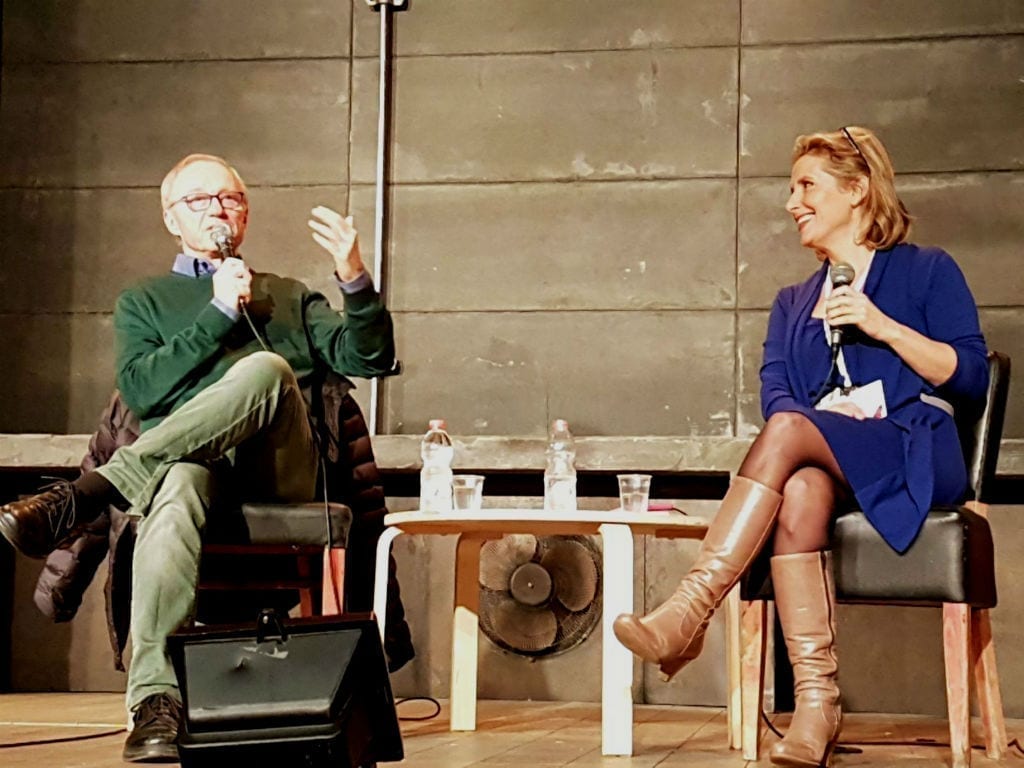David Grossman is a critically acclaimed Israeli author whose books have been translated into more than 30 languages. He has won numerous literary awards, including the much-coveted Man Booker International Prize in 2017.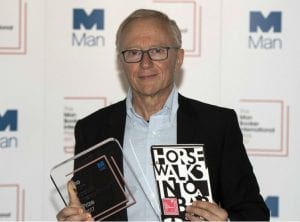
The stage adaptation of two of Grossman’s novels, A Horse Walks into a Bar and To The End of The Land, are currently being performed at the Cameri Theatre in Tel Aviv.
Hadar Galron is an Israeli playwright, actress, screenwriter, and comedienne.
HG: Why do you think your books are so frequently adapted for the stage and for the screen?
DG: I always look for the drama in the situation. Drama doesn’t have to be violent, but there should be conflict.
Grossman reflects on the adaptation of his last two novels To The End of the Land, which he completed after his son was killed in the Lebanon war and A Horse Walks Into A Bar.
DG: … I write quite complicated books. There’s a lot of pondering and philosophical thinking and flashbacks. I don’t think it’s so theatrical. They insist (the directors), and sometimes they succeed (to adapt them to the stage). But I will add another part of the answer, another layer, which is almost technical—but maybe it’s not only technical. I’m a very concrete person. Even when I write about those philosophical things, emotional things, I want to know exactly where everyone who takes part in the scene, where he stands or sits, how far he is from the other person. Is he moving his hands or not? How does he look? What are his or her expressions? All these are very important for me.
Now while we’re speaking, I’ll give you another thought on why I write such thick books and not haiku poems. Since I was a child of nine years old, I was a radio actor.
HG: You were an actor?
DG: Yes, in radio plays, in many, many thousands of radio plays. I think I’m trained to write dialogue. Now writing dialogue is not only to split the information between two people, or three or five. In a way, it’s life perception. A situation is created by different points of view.
HG: You know, the people sitting here are all dramaturgs or playwrights or directors, so they well know what you’re talking about.
DG: Yes, so, the last version of every book that I write—and I say last version because I’m writing sometimes twenty, twenty-five different versions of every book—and I don’t do cut-and-paste. First I write, and after I have too many notebooks on my table, I move to the computer. But the last, last version is the version which I read out loud, the whole text. To The End of the Land took something like five weeks.
HG: It’s over seven hundred pages if I remember correctly.
DG: Yes, it’s quite a task.
HG: So for a few weeks you’re just reading out loud.
DG: When I read—and this I think has to do with my radio history—when I read out loud I suddenly hear how things will be heard in the inner ear of the reader. Later I discovered that I did not invent this method. The great genius Flaubert used to stand at his window and shout out all his novels to the great sorrow of his neighbors. I’m much more merciful to my neighbors. So many mistakes and faults surface when you read it out loud. And you get the melody of the story, the melody of each of the characters. And after all, literature is very much about music. It is a musical art.
HG: All art I think in the end comes to some kind of musical layer. I want to speak a bit about the first play they’re going to see of yours. The play is A Horse Walks into a Bar. It’s about a stand-up artist named Dovaleh. I would like you to tell us a bit about Dovaleh, without spoiling it.
DG: It’s very hard with this play. I will try. Dovaleh is a fifty-seven year old 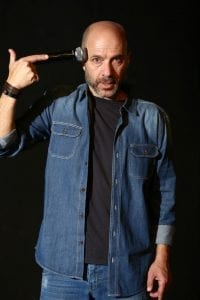 Israeli stand-up comedian—not the best one, not at the zenith of his career nor the zenith of his life. Divorced three times, he has five children that he doesn’t have very good—or at all—connection with. As you’ll see, he starts the evening with the usual rhythm, with the game between the performer and the audience. Especially in stand-up comedy it’s a sometimes brutal art, like punching your face or boxing your stomach. He knows how to do it. He flirts with the audience, and he insults the audience. And it goes as expected until something happens. And here I will stop telling you about that. The whole situation takes a different direction, and he himself takes a different direction.
Israeli stand-up comedian—not the best one, not at the zenith of his career nor the zenith of his life. Divorced three times, he has five children that he doesn’t have very good—or at all—connection with. As you’ll see, he starts the evening with the usual rhythm, with the game between the performer and the audience. Especially in stand-up comedy it’s a sometimes brutal art, like punching your face or boxing your stomach. He knows how to do it. He flirts with the audience, and he insults the audience. And it goes as expected until something happens. And here I will stop telling you about that. The whole situation takes a different direction, and he himself takes a different direction.
I think that only after I finished the book I understood what this story is about. I think it is about a person who lives in parallel with the life he should have lived. I think we all know people like that, people who live in parallel of their real life, of their real identity, their real “self”psychologists would say, people who learn to live in a place that is not really theirs. And because we humans, we are very adjustable and flexible creatures, they adjust to the distorted situation. We see people who are trapped in the wrong profession, for decades. And they hate every moment of it. And yet they are stuck there– because they cannot leave it, because they need the money, because nobody wants them out. There are people who are trapped in their own marriages. I’m not talking about anyone here, of course; present company excluded. I’m not talking about Jerusalem or Tel Aviv—you’re perfect. (Audience chuckles.) Or people who are trapped in the wrong gender all their life.
They are there because of the expectations of their parents and their friends and the zeitgeist. They know how to play the game. But sometimes the abandoned self keeps sending pulses of insult, and of pain, and of grief even, because someone has been murdered. Another self has been murdered. What I tried to do in this story is that there will be this rare moment of grace for Dovaleh in which he will unite with his real self. This real self is not necessarily a very pleasurable one, but it is us. It’s the only thing we really have. We don’t have money, we don’t have fame, but we really have ourselves. For me this is one possible line of the story.
Another line, if you’ll allow me, is the place of guilt. It takes a great part in the life of so many people that I know, of myself as well. I learned in writing this book that I think that sometimes we are using guilt in order not to feel something. We say yes we are guilty of something terrible that we have done or that we have been. But then this idea of guilt is only like a stone that is blocking the mouth of the way of real feelings and real thoughts and real devotion that we should explore. We just pay this lip service and say we are guilty. Just feel that we have done our duty, and that’s that. 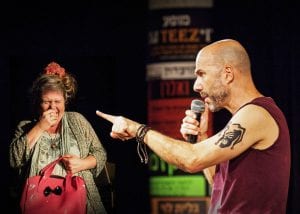
HG: That’s beautiful. I think that one of the reasons that people immediately want to adapt what you write to the screen or to the stage is not only the things you mention, but also because you manage to touch the core of really painful nerves and wounds in which we built this land, in which we live in this land. And through Dovaleh, for example, it is the pain of being the son of two Holocaust survivors, of two parents who went through camps and brought their trauma with them here. He was born into this, which is maybe why it’s so difficult to touch that younger self.
Another thing I wanted to ask you about is, in many of your stories, Dovaleh actually looks at himself as a child. And also in To the End of the Land, it’s a mother looking at a child. In many of your stories you’re either actually looking in at the child’s point of view or at someone looking at a child from their point of view and watching the child grow up. Who is this child? Is it Grossman? Is it your kids? Tell us more about this.
DG: Partly it is I guess. Partly it is me. I must say tell you even when I don’t write about me, after a while I start to believe it was my story, my experience.
HG: You can see yourself in it.
DG: Possibly I write about children because they’re so exposed. Because being a child means, among other very good things, also to experience an endless effort to understand, to decode, to belong. So many things kids acquire in the first years. There is such a need in them to belong, and to understand the codes of the family—of who belongs to the family and who does not, how we treat the two parties differently, the code of behavior, what is right, what is wrong, the codes of the language. The child all the time faces things that he cannot even articulate the questions for: What does it mean that suddenly Grandpa vanished, is not here anymore to play with me, and Grandma is crying and everybody’s crying and telling me that he’s somewhere in the sky? Or how can it be that I came back from the summer holiday and my best friend is twenty centimeters taller than me? What is this injustice?
HG: This is personal I take it!
DG: Very pathetic! (Chuckling.) I can save on psychologists by being here with you.
On top of that, there are the enormous energies of decoding the world, of finding their place, of finding the words to express what they feel—of just discovering things, all the time! I have two granddaughters. I follow them with such amazement. What does it mean to understand “what is me?”—“Ma zeh ani?”– what is this self, this ani?
You know, she was in the bathtub, and she looks at her fingers, and there are all the marks that the water leaves on the fingers after a long period in the water. And it happens to her. It’s her but there’s an alienation that she didn’t choose it, that she’s surprised by it. There’s all this feeling that she’s constantly surprised and then betrayed by the world. They find themselves in a tantrum, but a moment ago they did not feel like tantruming. Or with their pants full with what they did. All the time they are betrayed. Again, it is an effort. I want to document it, and I want to remember it.
I feel that I still have some open corridor between my life, my age, and my childhood. I remember my childhood very, very dimly. And I remember this duality of being a very social and sociable child, and yet feeling totally lonely. I think I am the loneliest child on earth.
HG: Lonely because of what you described before, or because of something else?
DG: You know, I wrote a book for children called Techad Hibuk. It tells a story about a mother and a child. I think he’s four years old. They’re walking in a field together in the sunset, and their dog is with them. Suddenly the mother, flooded with emotions of love and pride in her wonderful child, as we all feel, sometimes, she hugs him and she says “You’re wonderful! You’re one and only! You’re unique. There’s nobody else like you in the whole world.” And she keeps walking, and suddenly she notices that he stands. And he says, “Is it true? Is it like that? There’s nobody else like me in the whole world?” And she says, “Yes, you are unique.” He says, “But I don’t want to be the only one like me in the whole world.”
This story is based on a real story, on a real conversation between a mother and child. The mother was totally unprepared for this almost tragic point of view of the world that the child had–because if he’s unique, nobody can really understand him, deeply. Nobody can really understand him. I think this child taught his mother a lesson, and it’s so true. Because suddenly she also realized that she is only one and only and the dog they walk with is one and only. And if all of us are like a closed monad of Leibniz, trapped in this bubble, maybe all the idea of communication, of language—let’s say we have to take it with a grain of salt. Maybe when we say something to each other, maybe he or she does not necessarily understand it as we want to be understood—which I think is a very strong, human urge, to be understood—to be understood as you want to be understood. Maybe it’s a reason for writing books.
HG: There’s also a kind of loneliness in being a writer I think. From the beginning you kind of take yourself out. I know I feel this a lot of times myself. I can relate also to the feeling of being lonely as a child, of taking yourself out of a situation, of being an outsider so that you can see the whole picture from all the different angles.
I want to speak to you again about To the End of the Land, which is the play we’ll be seeing on Sunday night, another play that touches a really hard, harsh, open nerve in Israeli society. I remember when my son was born. I have a daughter. After my daughter I had two sons. The son that was born after my daughter was a regular birth. I was just waiting for them, you know—“Give me him already. Give me him–I need to breastfeed the child.” And they give me my son, and I took him in my arms. And I was totally unprepared for this gush of fear, total fear. My whole body started shaking. I thought to myself, “Oh my G-d, what’s going to happen to him when he’s going to be eighteen? He’s going to go into the army.” I was so surprised at this feeling. I didn’t realize it was even coming. I had no preparation. Nothing I thought of. I mean, I knew I was having a baby boy. It was something so vivid and so scary. This is what you touched in your book To the End of the Land, about a mother actually trying to run away from some kind of… 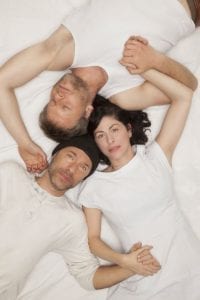
DG: The scene you describe can in a way summarize up the whole book.
HG: 700 pages!
DG: It is a story about how deeply the outer situation of us in Israel infiltrates into the protective bubble we want to create for ourselves, for our children, how so many things that you are doing in your life in Israel are implicated, and cannot be separated from the general situation. How can you raise children on values of openness, curiosity, pluralism, even trust? We all want our children to grow up like that, to be illuminated with the basic qualities of openness and immediate sympathy and not suspicion toward another human being. All the time when you are doing that, when you encourage these qualities inside them, you have the slight doubt that maybe you do not prepare them for the life here, in this catastrophe zone of our life, with the endless wars one after the other. Maybe we are in a way doing an injustice to them, not preparing them for the brutality, even the hatred and the evil that prevails in our life.
In my book, Ora—Ora is an Israeli woman. She is fifty years old. She’s the mother of two sons. One of them is about to end his military service. He’s twenty-one. He served three years here, from eighteen to twenty-one. Her son served in the occupied territories. And she felt that he has changed painfully ever since he went to the army. This is almost natural, because if you have to function in those areas of occupation, you have to harden yourself. You have to cover yourself with layers of toughness and even brutality, just to protect your frail and quite often delicate inward (self). And she believes that if she convinces him to go with her–after he gets out of the military service, after he brings back all his equipment–she will take him and they will go to the Galilee and walk there for a week, only him and her. She hopes that, if they are there, she will be able to massage his reluctance to be open and to be warm towards her. She hopes she will be able to regain the child that he used to be from the shell of the warrior.
But then, moments before they take off for the road, he calls his comrades in the army because there is another military operation in the West Bank. And he wants to join his comrades and go there. She brings him there, and she goes back home. And she has a very strong intuition that very soon the notifiers of the army will come and knock on the door and tell her that he died.
Then, after she freaks out for some hours, she realizes that it takes two to deliver bad news, one to deliver and one to receive. “And what if,’ she thinks. “What if I’m not here to receive the notification?” She has this magical thought that, if they cannot find her, the whole wheel of events will be reversed. For some time, for a day until they find her—Israel is a very small place—five hours, an hour, she will gain fifteen minutes, in which she will be able to turn back the wheels of reality. She goes out of home. She goes to the end of the land, to the place where Israel ends, between Israel and Lebanon, the border.
But of course, when I say in English or in Hebrew “to the end of the world”—the name in Hebrew is different. It’s “A woman is taking the news”—there is also a line in the story where she talks about the end of the land. For every Israeli, there is this slight pain in his heart or her heart when we say that. Because in spite of all of the strength that Israel radiates and in spite of all the militarization and the enormous military equipment that we have acquired, every Israeli—every Israeli, I think I can say this—feels, experiences this deep subcurrent of existential danger, of the fear of what might be, G-d forbid, I will say—I am a total atheist, but about this I will be happy to say ‘G-d forbid’—if something happens to Israel.
This is also a kind of dualism that we are experiencing all the time: being a very strong superpower and being very, very fragile, not having any real confidence in our future, in the option of having a future. Our life is really very, very shaky. I don’t know if you in your tour here were able to sense that. If you know this slight nuance of our life, which in a way dictates most of our political behavior and military behavior as a country.
HG: Many of the plays they are seeing touch somehow this core as well. David, you lost a son in the army as well, in 2006. Was this in correlation to the book To the End of the Land?
DG: We lost Uri eleven years and three months ago, in the war against Lebanon. I started writing To the End of the Land when he joined the army because I felt I wanted to accompany him as much as I can. I wanted to write about the soldier, and not write about the soldier who serves in the occupied territories. I don’t want to go into that too much, but he was a very active part of it, because so much of the information that I needed I used to call him and ask him. And every time he came home on vacation he would say “Let’s see what now you have done to your poor protagonist.”
I cannot tell about really what was in these days. I can tell about what happened later. When I came back to writing, in a strange way the only thing that remained solely and confident in my life was this story. It’s very strange. I was very grateful that I was writing this book and not any of my other books. Because this allowed me to totally be in my situation, not to avoid it, not to sublimate it, not to turn my back on it, but just to be there and to start to feel the need to sustain my story and my characters. This was kind of a responsibility, to feed the protagonist with biography and with a sense of humor and with passion and with ideas. This was very strong in me. I found out that doing that in a way brings me back to life.
After that I wrote a book that is called Falling Out of Time, which describes what it means to live with such a loss. What does it mean now that you have to get used now to your new life? And I learned something. All these books teach me; it’s a very educating process, the process of writing a book. It taught me something: We don’t know what happens on the other side of life. We have no idea. Religious people can draw some comfort from the idea of Paradise or Hell or afterlife. I’m a total atheist. I’m a nonbeliever. I cannot believe in that. I think that what we have is what we have. It’s even important for me to believe that there is no afterlife, that this is the last chance we’ve got. But I learned something, that there is one thing that can be helpful for somebody like me. When I come to think about what happens after death, if something happens, I think that the only thing that allows us to think simultaneously both about the total nothingness of death and the total wholeness of life is art—literature and theater and music and cinema. This is, for people like me, the only place, not of comfort, but at least of not avoiding holding the two electrifying poles, so to say, at the same time, and to feel the total nothingness and to want to come back from it to the wholeness of life.
HG: Thank you. Thank you very much. We have just a few minutes for questions. If anyone has any questions for David Grossman, this is the time.
(Audience member:) How do you come up with the ideas for the stories you write?
DG: How do I come up with ideas?
HG: Yeah, give us the recipe!
DG: Listen, if I knew where good ideas are, I would go and sit there all day.
HG: Maybe they come to you.
DG: They come. Usually they surprise me. It’s never a very ordered way of thinking. There must be a kind of mutation, a sparkle that suddenly comes from a place that is more courageous than me, and…more everything than me. I just know. This I can testify. I know when there is a good idea because I almost immediately start to have a kind of fever. And I’m absolutely healthy but it’s a fever of excitement. I feel that there is something new in the world. That’s what I feel. I say I never read anything like that, and I will have the privilege to write it. Then I walk. I’m a walker, all the time. I mean, I walk in nature every day, but also in my room. When I have a good idea, I start walking circles. My wife says she always knows when I have a good idea because there are burns on the carpet. I think I just have to ventilate myself. Once a professor of the brain explained to me why I have to go like that. I didn’t like it. I’m doomed to do it.
And then, you know, good ideas have to be worked on, sometimes for years, in order to understand them, to understand what they tell us. I think a good book is a book that allows us many readings, that there are many layers in it. Again, something that I learned from writing, everyone who has a story knows that there are many layers to it. Sometimes we prefer to congeal in the upper, sometimes more superficial layer of our story, our official story, the story that we give new people that we meet in our life as a calling card. We know how to tell it in a good way that will gain us the sympathy of other people, or the love of other people, And we do not notice to what extent we have become prisoners of this official story, that maybe we are now in a different situation than when we first told this story about, let’s say, our childhood. Maybe we are much more able now, much stronger, much more forgiving to our parents. We can move more freely in our story, not to be trapped in this superficial…
HG: Narrative?
DG: Yes, and when I say it, of course, I think that not only individuals can benefit from this, but also countries, societies…
HG: Yes, we can change our narrative if we decide to stop bleeding.
DG: I think that a narrative is a human story that has congealed, that has frozen. Then it becomes a narrative. This is why, when the Israeli and the Palestinian narratives meet each other, they clash. Because narratives are hermetic. They do not allow any place for a real dialogue. What I think I try to do, both when I write about relationships in the family—between a man and a woman, siblings, parents and children—but also when I write about Israelis and Palestinians, is to massage the narrative, to allow the human story to surface.
HG: Great. This is where we’ll end.

